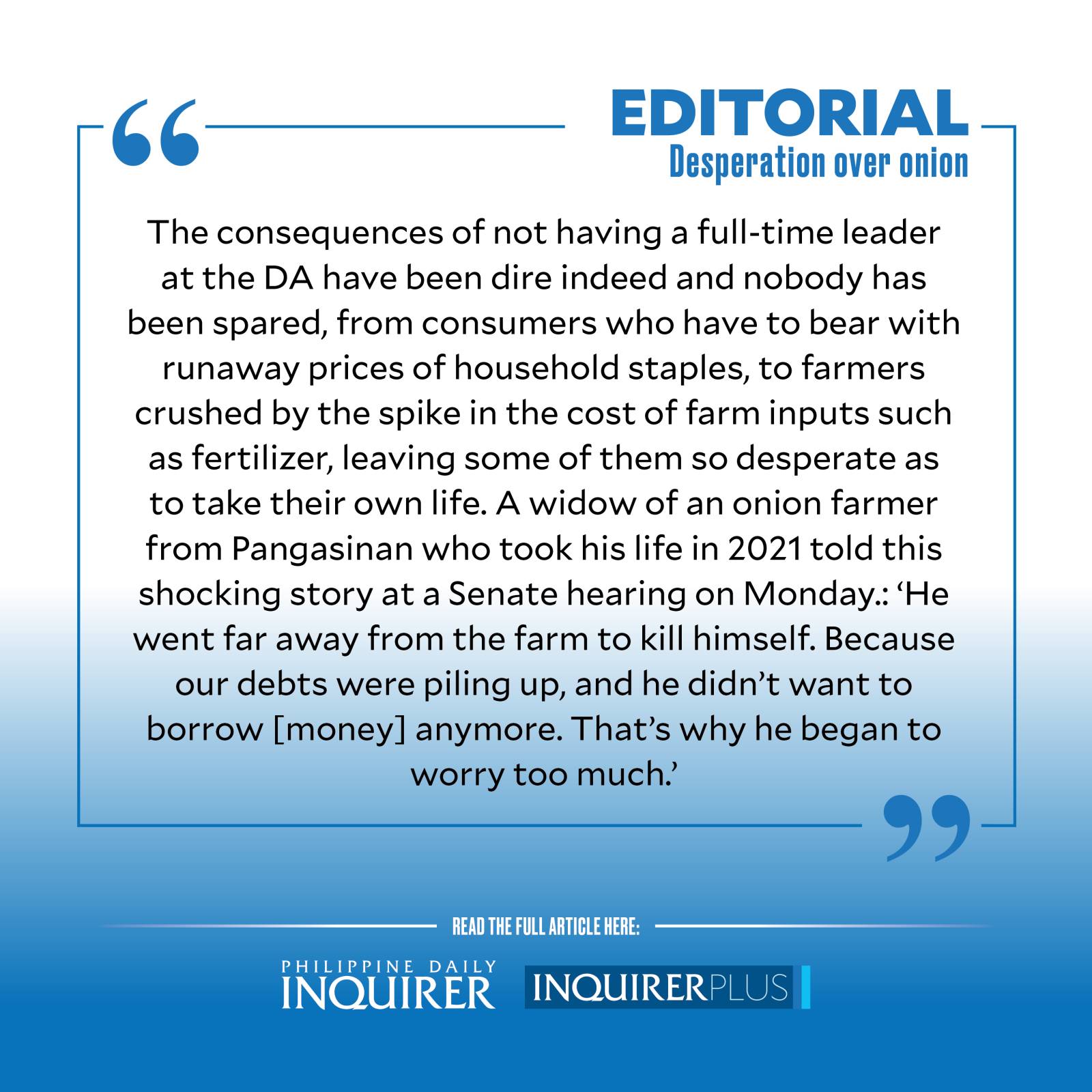Desperation over onion
 After 10 flight attendants got into trouble last week for bringing in from the Middle East about 40 kilos of agricultural products including onions, the Bureau of Customs (BOC) reminded travelers that they cannot bring in vegetables and other plant products into the country without clearance from the Bureau of Plant Industry, to prevent the entry or spread of pests and other plant diseases.
After 10 flight attendants got into trouble last week for bringing in from the Middle East about 40 kilos of agricultural products including onions, the Bureau of Customs (BOC) reminded travelers that they cannot bring in vegetables and other plant products into the country without clearance from the Bureau of Plant Industry, to prevent the entry or spread of pests and other plant diseases.
That the BOC even had to remind travelers on social media about this ban is another indication of how disjointed and chaotic the agriculture sector has become, such that onions, retailing locally for as much as P700 a kilo, have replaced imported fruits, chocolates, perfume, and shoes as the Filipinos’ favorite “pasalubong” for their families, Sen. JV Ejercito noted.
Onions, after all, have become three times as expensive as chicken and up to 50 percent costlier than pork or beef.
An incensed Ejercito joined other senators in calling out the BOC during the recent hearing of the Senate committee on agriculture, food, and agrarian reform, for coming down hard on the flight attendants whose goods were valued at about P8,500, while big-time smugglers who brought in P1.226 billion in contraband agricultural products last year have remained scot-free.
The issue with onions, however, is deeper and more serious than just the sneaking in of contraband pasalubong.
For Sen. Imee Marcos, who sought a Senate investigation into the runaway prices of onions, the worsening crisis boils down to poor planning by the Department of Agriculture (DA) that is incidentally still headed by her brother, President Marcos Jr.
“The price of onions has taken us on this mad rollercoaster ride during the last few months. It is apparent that there is an abject lack of planning [on the part of the DA],” said the senator.
This, in turn, has forced the government to take desperate measures such as the emergency importation of 21,060 metric tons of fresh yellow and red onions by Jan. 27 in a bid to stabilize prices that have skyrocketed by as much as 360 percent in just a year—from P200 to as much as P700, a price that breaches the minimum wage.
The timing and manner of the importation, however, has been widely criticized as the imported onions will arrive just as local onions are being harvested, thus forcing farmers to sell at a loss to compete with the expected lower-priced imports.
As Sen. Grace Poe pointed out during the hearing, onions have been trading at steep prices for months, and yet the DA had stubbornly maintained that no importation was necessary. This, despite Philippine Statistics Authority data showing a shortfall in local onion production in 2022.
Then there’s the question of the unusual manner of importation that, according to a Jan. 12 report by the US Department of Agriculture, comes with conditions so extreme that they “all but guarantee” that the target volume will not be filled because of the tight Jan. 27 deadline. The conditions “greatly favor” China due to the tight window to bring in the imports, and its proximity over other sources such as Europe and India.
Better and more coordinated planning would have easily prevented these avoidable problems with short deadlines, high prices, and lack of import sources that have burdened Filipinos who are reeling from a 14-year-high inflation.
Given this, the oft-repeated call for Mr. Marcos to let go of the agriculture portfolio and appoint a full-time secretary accountable for solving this worsening food crisis has again been sounded. Perhaps Senator Marcos could help prevail upon her brother to do this?
The consequences of not having a full-time leader at the DA have been dire indeed and nobody has been spared, from consumers who have to bear with runaway prices of household staples, to farmers crushed by the spike in the cost of farm inputs such as fertilizer, leaving some of them so desperate as to take their own life. A widow of an onion farmer from Pangasinan who took his life in 2021 told this shocking story at a Senate hearing on Monday: “He went far away from the farm to kill himself. Because our debts were piling up, and he didn’t want to borrow [money] anymore. That’s why he began to worry too much.”
It’s time someone took responsibility for nonaction over this agricultural crisis, Poe said, pointing out that kitchen staples, including sugar and onions, have been subjected to “price gouging, supply manipulation, and smuggling.” Said the senator, referring to the onion shortage: “Wala tayong mahiwa pero iyak pa rin tayo nang iyak (There’s nothing to slice but we keep on crying).”
Indeed, if nothing drastic is done to resolve at the roots the problem of expensive agricultural products instead of adopting costly band-aid solutions, then even more lives may be lost. Instead of endless discussions on this perennial problem, why not put forth and implement real, lasting solutions?
Identifying and going after unscrupulous middlemen, cartels, and smugglers would be a good start.




















